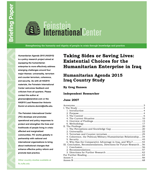Iraq places the frailties and fault-lines of the humanitarian enterprise in stark relief. Perhaps more than any other highly politicized context, Iraq has fueled a defensiveness and sense of existential threat among many in the humanitarian profession. And yet, while Iraqis have paid long and dearly for the flaws in the international humanitarian apparatus, evidence from ground-level suggests that pronouncements of the demise of principled humanitarian action are premature. Iraq may provide the strongest affirmation yet of the endurance of the Dunantist ethos and of the principled practice of humanitarianism.
Taking Sides or Saving Lives: Existential Choices for the Humanitarian Enterprise in Iraq

ASSOCIATED PROJECT
SUBJECTS
PUBLICATION TYPE
LOCATION

RELATED PUBLICATIONS
This briefing describes the key elements and issues associated with conflict in pastoralist areas across sub-Saharan Africa.
•
Ce document d’information décrit les éléments clés et les enjeux associés aux conflits dans les zones pastorales d’Afrique subsaharienne.
•






